Nevis Education Minister troubled by Federation’s decline in level of excellence in literacy
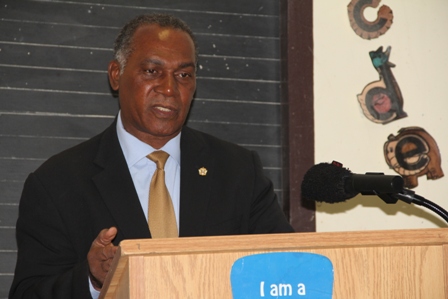
Premier of Nevis and Minister of Education Hon. Vance Amory delivering remarks at the Ministry and Department of Education’s Reading Assessment Training workshop at Marion Heights on February 17, 2014
NIA CHARLESTOWN NEVIS (February 18, 2014) –Premier of Nevis and Minister of Education Hon. Vance Amory described as troubling, a decline in the level of excellence in literacy in St. Kitts and Nevis and welcomed a workshop designed for primary and secondary school principals to stem the trend.
Mr. Amory who was at the time delivering remarks at the Reading Assessment Training workshop hosted by the Ministry and Department of Education at Marion Heights on February 17, 2014, noted that the training would help to reverse the downward spiral of literacy at the island’s secondary and more so primary schools.
“In our country we often boast of the high level of literacy among our people, there was a time when we talked of 99 percent literacy rate but this was commendable except that we are beginning to realise that we have to revise that high level, as we continue to see evidence that we may be slipping in the level of excellence in literacy which was the hallmark of the educational achievement in St. Kitts and Nevis…
“It is troubling that we are retarding rather than progressing in this area and therefore, this training for you principals is to help us to reverse this trend which we are observing. The attainment of an acceptable level of reading competence, must be assessed on more than the ability to recognise and pronounce words but must be informed by the ability to be fluent in that process and also attaining the ability to understand and then be able to express the meaning of what has been read,” he said.
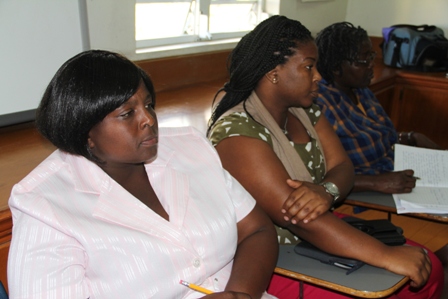
The Minister of Education stated that it would be a challenge for educators to get children to be more expressive instead of only being recipients of skills training.
“I want to contend that our children must be encouraged to not just learn to read but to express themselves, even as they are being taught to read. So that would require their verbal expression, the use of the language, it would also require the writing which should come and could come from their being asked to reproduce, in short form, what they’ve read from a story book, or newspaper or anything like that because it would help them to become, I believe, much more facile with the ability to read.
“This may be one of the avenues that we can use to strengthen the reading and learning experience and create a love and an interest in the acquisition of the reading skills we wish to develop in our children and enable us and yourselves, as heads, to identify if they are in fact learning and acquiring the skill,” he said.
Meantime, Mr. Amory urged the workshop’s participants to view the training as an important and critical exercise that would impact the educational development of the children of Nevis.
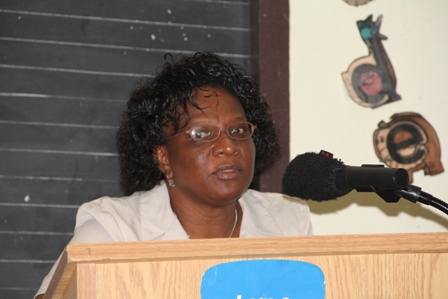
“The Ministry of Education and the Department expects that you principals and head teachers will see this exercise as the most important foundation for instruction in our schools. If our children have a good grasp of the language and the tools which make for that understanding of the language; the mechanics and the rudiments of language [then] reading becomes fundamental to this objective.
“You have been given and will no doubt get the guidelines to assist you in this most important area of our educational development of our children and I trust that you will grasp it and take it seriously,” he said.
The Premier stated that children who were confident and competent with reading skills exuded confidence which was evident in every aspect of their lives and as such opened them up to a vista of possibilities if they developed the skill of reading to a degree in which they would be able to communicate effectively throughout their lives.
However, he noted that the focus was on primary school students and explained the reason behind the decision to do so.
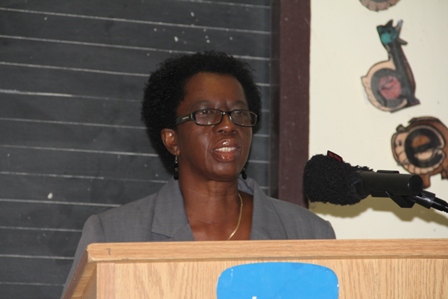 “I am aware that our focus is primarily on the primary school children and this is so because that is where the difficulties and the problems are being easily identified. It is true they manifest themselves at the high school level, so we now have to go back to the foundation and see what we can do to adjust and redirect this difficulty which is showing its ugly head.
“I am aware that our focus is primarily on the primary school children and this is so because that is where the difficulties and the problems are being easily identified. It is true they manifest themselves at the high school level, so we now have to go back to the foundation and see what we can do to adjust and redirect this difficulty which is showing its ugly head.“We want therefore, through your training and through the training of your teachers, to arrest this problem which is developing and seek to eradicate it from our midst in this 21stcentury. You have heard that this year is the year for attaining that level of eradication, so we have our work cut out for us but I am sure that we can achieve what we have been set to do this year, 2014. We would like every child to be able to read effectively by the time he or she enters high school and then be able to take the challenges and dealing with the different variety of subjects in a much more competent way,” he said.
According to the Education Minister, the training would provide teachers and principals with the skill to detect deficiencies that existed and to redress them where they were discovered.
“You will get the necessary training, the necessary assistance and you can, as you monitor your teachers, if you yourself are unable to assist them, you can then call upon the experts the reading recovery experts, the reading teachers who will give you the added resources and come in with their own resources to help to redress that problem.
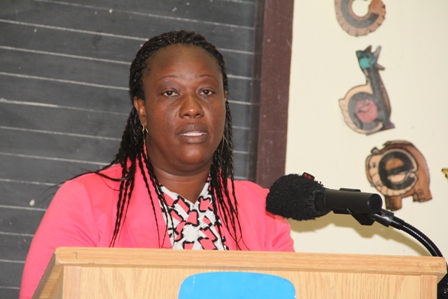
“It will not only help our children individually and as a class and as a school but it will also have a positive effect on our communities and how people interact and behave in our communities,” he said.
Other remarks came from Chairperson and Education Officer Ermileta Elliott and Eleanor Phillip, Learning Support Coordinator of the Curriculum Development Unit in the Federal Ministry of Education. Ilena Mills delivered a prayer while the vote of thanks was delivered by Terres Dore a trained graduate Reading Recovery Teacher and the workshop’s facilitator.
